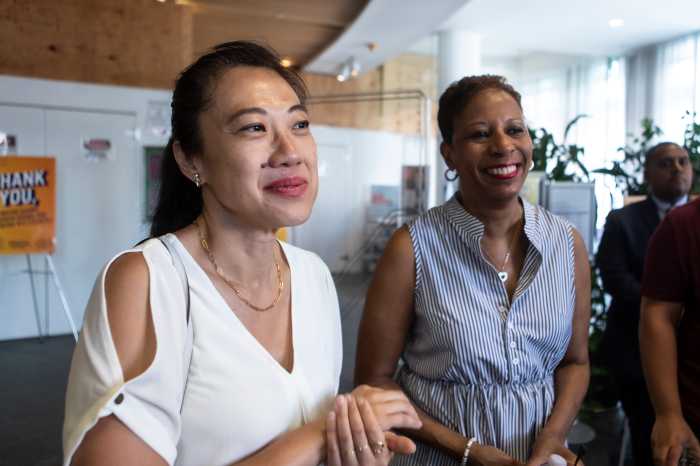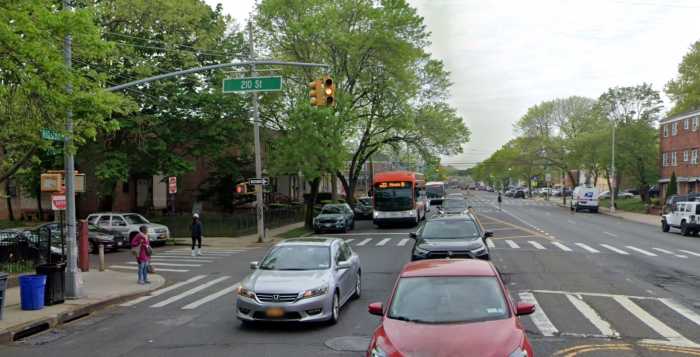By Adam Kramer and Daniel Massey
The heads of two Queens school districts have asked the U.S. Justice Department to block part of the city’s new school governance plan that would abolish community school boards on the grounds their elimination would violate the federal Voting Rights Act.
The presidents of the District 27 and District 29 community school boards filed letters with the Justice Department contending that elimination of the boards, whose members are elected by the public, would deprive minority voters of their rights.
Under the new school governance plan approved by the state Legislature last month, the city’s 32 school boards will be eliminated by June 2003 if the Justice Department gives the go-ahead — at which point a legislative task force will be formed with public hearings held to determine what type of body should be put in place of the boards.
Mayor Michael Bloomberg will have control of a 13-member advisory panel made up of a representative from each of the five boroughs and seven of his own appointees. District superintendents, previously recommended by community school boards, will be selected by the chancellor, who is appointed by and accountable to the mayor, beginning immediately.
Mark Corallo, a Justice Department spokesman, said New York City’s school governance plan “is still under review.”
Steven Greenberg, president of Community School Board 27, which covers Ozone Park, the Rockaways, Woodhaven, Howard Beach and South Ozone Park, said getting rid of the boards would be equivalent to “disenfranchising the voters.” The boards were established in 1969 to give parents a greater say in their children’s education.
In a June 21 letter to Joseph Rich of the Justice Department’s Civil Rights Division, Greenberg wrote that the new law “eliminates an elected office both denying and abridging the right to vote for minority voters in NYC without proposing replacement elected governance representation that meets the requirements of the Federal Voting Rights Act.”
In an interview Monday, Greenberg emphasized that the state cannot do away with elected boards without having in place a provision for continued elected representation for parents. In his letter to the Justice Department, Greenberg called the plan to establish a task force on parent participation a “vague promise.”
Greenberg has headed SB 27 for four years.
Nathaniel Washington, president of SB 29, which covers Cambria Heights, Laurelton, Rosedale, Hollis and St. Albans, lodged a similar complaint with the Justice Department the second week of June.
“Because we are elected officials, eliminating school boards is unjust to those who elected us,” he said in an interview Tuesday. “I believe in school boards. Areas need to be represented.”
The Queens Council of School Boards, of which Washington is vice president, opposes the dismantling of school boards.
Both Washington and Greenberg said they were disturbed the mayor has painted all community school boards as ineffective.
“It is not broken in all cases,” Washington said. “Money would be well spent not fighting to eliminate school boards, but by putting it into teachers, principal and superintendent salaries.”
State Sen. Frank Padavan (R-Bellerose), who chaired the Senate Majority’s Task Force on New York City School Governance and was a sponsor of the school governance legislation, called dissolving the school boards “hasty and ill-conceived,” according to spokesman John Gallagher.
The senator wrote a letter to the Justice Department expressing concern that the elimination of school boards and their power to select local superintendents would disenfranchise voters.
“The senator feels that before dissolving the school boards we need to determine what is in the best interest of the students, parents and teachers,” said Gallagher. “We need to determine what entity should replace them.”
Sheila Pecoraro, a former SB 29 member and longtime southeast Queens activist, applauded the efforts of Greenberg and Washington.
“I don’t always agree with the board, but it is the closest representation we have to education,” she said. “What will the average parent do if they don’t have a local person to go to? Go to the Board of Education?”
Reach reporter Daniel Massey by e-mail at Timesledger@aol.com or call 229-0300, Ext. 156.


































